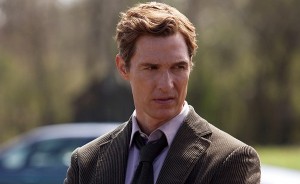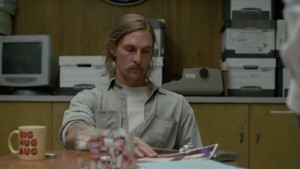TV Cultures Journal ‘B’ – Post #1: True Detective

True Detective is an American anthology crime drama created by Nick Pizzolatto which first aired on HBO in 2014. It centres on two Louisiana detectives, Rustin ‘Rust’ Cohle and Martin ‘Marty’ Hart, portrayed by Mathew McConaughey and Woody Harrelson respectively, as they attempt to solve the murder of a young girl. An anthology series involves a telling a new story each season with a new cast and characters embroiled in events separate to the previous seasons. A main draw of anthology series is that it is an assurance to viewers that the story being told will have a conclusion, unlike so many other American shows that have been cancelled prematurely. This also allows for higher calibre actors, even film stars, to join the cast as there are no long term commitments to the show in contrast to the lengthy popular series such as Game of Thrones or Breaking Bad. Both shows match and even surpass True Detective in popularity, yet the name recognition of its two lead actors draws in audiences to view a program they have never heard of before. This is highlighted by the following trailer for season one of the show as it focuses on McConaughey and Harrelson’s roles to entice viewers to witness leading Hollywood men immerse themselves in a television role.
A second selling point seen in this trailer and the overall marketing for True Detective is that it is an HBO show. The show was hailed as “the latest greatest-ever television series from HBO” (Rundle, 2014) and was critically lorded by critics and audiences alike for its cinematic aesthetic, ingenious storytelling and cinema worthy performances. The term ‘greatest-ever’ is an encapsulation of the show as it quality worked in conjunction with its airing on HBO to place it on a pedestal alongside other ‘greatest-ever’ television shows such as The Sopranos, The Wire and Game of Thrones. “Although a cable service such as HBO has a very small audience of subscribers […] they happen to be the very upscale demographic willing to pay extra for more specialised and more highbrow fare” (Feuer, 2007). This characterisation of the channel adds an elitism to its programming and Cary Joji Fukunaga’s direction injected True Detective with a cinematic aesthetic. It is rare for every episode of a television season to be directed by a single person like Fukunaga did and this aspect helped to legitimise the show as a piece of cinema made for television. It draws on familiar conventions found in crime dramas and police procedurals but particularises it as a form of ‘complex narrative.’ Jason Mittell states that “HBO has built its reputation and subscriber base upon complex narrative shows” (2012) and True Detective builds upon this representation. Narrative complexity “redefines episodic forms under the influence or serial narration” (Mittell, 2012) and True Detective typifies this definition through its anthology structure and intricate plot revolving around two rich characters.
Rust Cohle and Marty Hart are the core to the season, they are the tellers of the story the audience is witnessing and the constant shift between time periods reveals how the events of the past have affected the protagonists. The intrigue surrounding Cohle’s drastic change in physical appearance and behaviour suggests the case changed him forever and this character study is the core of True Detective. The intricacy of the plot, revolving around multiple murders and the lives of the two main figures, coupled with themes centred on masculinity and religion create a narrative that viewers must fully invest to connect with the depicted events.
References
Mccabe, Janet & Akrass, Kim (2009) ‘HBO and the Concept of Quality TV – Jane Feuer”, Quality TV: Contemporary American Television and Beyond, pp. 147-157
Mittell, Jason (2012-13) ‘Complexity in Context, Complex TV: The Poetics of Contemporary Television Storytelling, pre-publication ed. Found at: < http://mcpress.media-commons.org/complextelevision/ >
Rundle, Guy (2014) Rundle’s Review: Confessions of Television’s True Detective, Daily Review, Found at: < http://dailyreview.com.au/rundles-review-confessions-of-the-true-detectives-america/6484 >


Leave a Reply